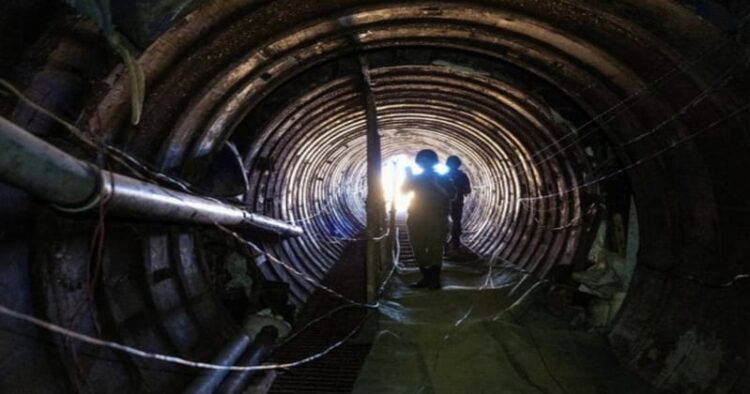The Israeli military officially acknowledged on January 30 that it has been employing a unique strategy of pumping “large volumes of water” into suspected Hamas tunnels in Gaza. This confirmation comes after weeks of speculation and reports suggesting the Israel Defence Forces (IDF) were testing the method of seawater pumping into tunnels.
The IDF, which initially remained silent on the matter, released a statement outlining the use of “new capabilities” to target Hamas infrastructure in the Gaza Strip by channelling substantial amounts of water into the tunnels.
“The IDF has implemented new capabilities during the war with the aim of neutralising underground terrorist infrastructure, including by channelling large volumes of water into them,” the statement read.
“This method was developed in cooperation with the @Israel_MOD, and is only utilised in locations where it is suitable. The IDF takes into consideration the soil and water systems in the area, matching the method of operation to each specific case,” the statement added.
“This is a significant tool in combating the threat of Hamas’ underground terrorist infrastructure,” it also said.
The statement clarified that tools such as pumps and pipes were employed and emphasised that the water pumping was executed selectively in tunnel routes deemed suitable for this method.
The move has raised concerns about the safety of hostages believed to be held underground in Gaza. When discussions about flooding tunnels first emerged in December, experts expressed apprehensions about potential risks, including the contamination of freshwater supplies and damage to surface-level infrastructure, CNN reported.
Hamas, the Palestinian militant group controlling Gaza, downplayed the potential success of Israel’s tactic, asserting that its tunnel network was designed to withstand such flooding.
Experts note that the flooding operation could force Hamas militants to relocate within the tunnels, providing Israeli intelligence with opportunities to identify militants and potentially locate hostages. The scale of the IDF’s tests, including the amount of water and pressure used, remains unclear, adding an element of uncertainty to the potential impact on Gaza’s subterranean infrastructure.
Historically, the use of tunnels in warfare is not new, with examples ranging from the French in the interwar period to al Qaeda in Afghanistan and the Viet Cong in South East Asia. However, Hamas’ tunnels are described as particularly innovative, known for their depth, sophistication, and extensive reach under the densely populated Gaza Strip, as reported by CNN.
The Israeli military’s approach mirrors previous instances where flooding was utilised to counter tunnels. In 2018, the IDF flooded tunnels allegedly constructed by Hezbollah on the Israel-Lebanon border with cement, causing spillage onto the surface in southern Lebanon. Similarly, Egypt employed flooding in 2013 to block tunnels beneath its border with Gaza, using seawater, sewage water, and cement.
While the IDF claims to have destroyed hundreds of tunnel shafts in Gaza, the strategic use of water to flood them presents potential challenges. The risk of damage to Gaza’s infrastructure and freshwater contamination is heightened when tunnels are flooded beneath populated areas.
As of now, the Israeli Government faces public pressure to retrieve hostages alive and leaked audio recordings of a meeting between freed hostages and Prime Minister Benjamin Netanyahu revealed concerns and anger regarding the possibility of tunnel flooding, CNN reported.
(with inputs from ANI)




















Comments